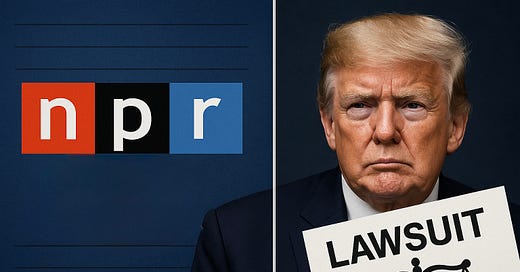NPR Is Suing Trump—and It’s More Complicated Than They’d Like You to Think
The Trump administration can absolutely dictate who can and can't attend press events. But the funding issue? NPR may have a case.
First thing Tuesday morning, NPR filed a high-profile lawsuit against President Donald Trump and multiple federal agencies, alleging a long list of constitutional and statutory violations. On its surface, it reads like the kind of case the media class dreams of: the press standing up to a president they’ve long accused of hostility toward the First Amendment.
But take a closer look, and the claims are a little more tangled—and a lot more dependent on facts NPR hasn’t yet proven.
The case raises legitimate questions about access, retaliation, and the line between public accountability and political posturing. It also raises an equally important question that no one in legacy media seems willing to ask: Why are taxpayers still funding partisan content?
Let’s walk through NPR’s core arguments—and where they do or don’t hold up.
Claim 1: First Amendment Retaliation
NPR alleges that the Trump administration unlawfully retaliated against its journalists by revoking press access, making public attacks, and threatening to defund the outlet over its critical coverage.
On paper, this is their strongest argument. The courts have long been sympathetic to claims of viewpoint discrimination, especially when it involves access to public forums. If NPR can prove that the Trump White House selectively targeted them because of the content of their reporting, they’ll likely survive a motion to dismiss.
But that "if" matters. There’s a difference between retaliating against speech and simply refusing to subsidize it. Shutting off taxpayer funding from a media outlet that has demonstrated persistent political bias is not automatically a First Amendment violation. NPR doesn't have a constitutional right to public dollars.
That said, federal courts tend to lean in favor of First Amendment protections, even when the facts are murky. If this goes forward, that’s probably why.
Claim 2: Fifth Amendment Due Process Violation
Here’s where the complaint starts to lose its footing. NPR is claiming that excluding reporters from White House events without notice or appeal violates the Due Process Clause of the Fifth Amendment.
That’s a stretch—legally and logically.
The Fifth Amendment guarantees due process in the context of legal deprivations, not press credentials. Denying access to a media briefing is not the same as stripping someone of liberty or property. No one is being fined, jailed, or put on trial here.
This feels like a throw-in claim designed to pad the complaint, not something that stands up to scrutiny.
Claim 3: Violation of the Administrative Procedure Act (APA)
This may actually be the most viable claim in the whole filing—and the one where the Trump administration has previously taken hits in court.
The APA requires that federal agencies follow formal rulemaking procedures, and if the White House (or affiliated agencies) denied credentials or changed press access rules without a clear administrative process, that could be a legitimate problem.
We’ve seen similar APA claims succeed in lower courts when Trump-era executive actions bypassed public input or failed to explain changes clearly. This might be the most legally grounded argument NPR has made, though it's still highly procedural and not the sweeping civil liberties crisis NPR will probably try to frame it as.
Claim 4: Misuse of Federal Resources to Target Journalists
NPR also accuses the Trump administration of deploying federal resources—possibly including the Secret Service or intelligence assets—to surveil or intimidate reporters. If proven, that would obviously be serious.
But that’s a big “if.” This is the claim that will likely get the most media traction, but legally, it’s going to be the hardest one to prove.
Unless there’s hard evidence—emails, memos, internal directives—it becomes one person’s narrative versus institutional silence. And while sympathetic judges may lean toward the press in the absence of clarity, even friendly courts are going to demand more than vague inferences.
The Bigger Problem: NPR's One-Sided Voice
Whatever the legal outcome, this lawsuit underscores a deeper issue that rarely gets discussed: NPR is not an objective outlet, and it hasn't been for years.
Its editorial direction is overwhelmingly slanted to the left. Stories that reflect center-right or conservative viewpoints are either ignored or presented through a lens of skepticism. This isn’t a new problem—it’s baked into the structure. And yet, the organization continues to operate with taxpayer support.
If NPR wants to be a partisan voice in the media landscape, fine—but it should do so without federal subsidy. There’s no reason Americans should be funding a public broadcaster that consistently reflects only one side of the public.
Does NPR Have a Case Against Trump?
NPR’s lawsuit may or may not succeed. Claim 1 has some merit. Claim 3 is legally sound. The others are weaker, if not completely off-base. But the larger question remains: how long are we going to treat publicly funded journalism as though it's owed constitutional deference, while ignoring the growing gap between what NPR says it is and what it actually does?
If we’re serious about free speech and accountability, we need to be just as honest about who’s holding the microphone—and who’s paying for it.



